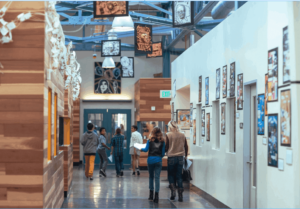What’s New in Leadership? Lifelong Learning + Project Management

By Jessica Slusser and Bonnie Lathram
“In many occupations, it has become essential to acquire new skills as established ones become obsolete. Burning Glass Technologies, a Boston-based startup that analyses labour markets by scraping data from online job advertisements, finds that the biggest demand is for new combinations of skills—what its boss, Matt Sigelman, calls ‘hybrid jobs.’” – Lifelong Learning is Becoming an Economic Imperative, The Economist, January 14, 2017
What’s new in leadership? As we have been writing throughout our project-based world series, the nature of work is changing. We are moving at a faster pace. There’s an awesome opportunity to make an impact, and the scale of our challenge is immense. People live, learn, connect, work and shop now on platforms.
But work is more competitive, and machines are edging out humans in the workplace. Globalization and urbanization are speeding change and also creating more competition. This is leaving many underemployed or disaffected (which might also be contributing to populist movements around the planet).
Many Americans are participating in the gig economy. Many people are piecing together employment by working numerous jobs or as freelancers. And whether employed full-time or in various “gigs” people are managing their work in projects.
So what does this all mean for education leaders? Leaders need to have deep project management experience, know how to be creative and do the jobs (and create the jobs) that machines can’t do, and encourage the development of skills and dispositions needed for 21st-century learning.
How can we grow leaders with deep project management skills and 21st-century learning skills?
Leaders Are Lifelong Learners
First, let’s make an assumption that leaders are also learners. A 2016 Pew Research Center Report found that “a large majority of Americans seek extra knowledge for personal and work-related reasons.” Specifically, they found that:
- 73% of adults consider themselves lifelong learners.
- 63% of those who are working (or 36% of all adults) are what we call professional learners – that is, they have taken a course or gotten additional training in the past 12 months to improve their job skills or expertise connected to career advancement.
People cite several reasons for their interest in continuing their learning. For workers who took a course or got extra training in the past 12 months, their reasons for wanting to do so ranged from career growth to job insecurity:
- 55% of full- or part-time workers say they participated in work or career learning to maintain or improve their job skills. This means 87% of professional learners cited this as the reason they wanted to improve their skills.
- 36% of all workers say they did such learning in order to get a license or certification they needed for their job. That comes out to 57% of professional learners who cited this reason.
As Andrew Palmer writes, “To remain competitive, and to give low- and high-skilled workers alike the best chance of success, economies need to offer training and career-focused education throughout people’s working lives. Palmer’s report charts some of the efforts being made to connect education and employment in new ways, both by smoothing entry into the labour force and by enabling people to learn new skills throughout their careers. Many of these initiatives are still embryonic, but they offer a glimpse into the future and a guide to the problems raised by lifelong reskilling.”
As we wrote in 10 Reasons Why Lifelong Learning is the Only Option, today the average person changes jobs ten to fifteen times during their career. Technological change requires a stronger and more continuous connection between education and employment. Organizations and school leaders are catching on to the fact that continuous improvement and lifelong learning is the way forward.
For example, Mayerson Academy is challenging leaders to take 5 minutes per day (#5toThrive) to build social and emotional skills—and the non-profit organization, based out of Ohio, is also providing a free Toolkit to help. MOOCs, online courses, Twitter chats and a myriad of new platforms also provide ways that leaders can “skill up” at their own pace, in ways that are personalized for their own growth goals and contexts.
Leaders Are Project Managers
Having the skills to manage a series of projects is more important than ever. Project Management Institute Educational Foundation’s mission “is to inspire and empower people to realize their potential and transform their lives and their communities through the use of project management knowledge. Our vision is that all people worldwide have a better tomorrow by applying project management skills in their daily lives.”
Watch Career and Technical Education teacher Karl Ruff in Seattle discuss how he’s incorporated project management skills into his courses in a Seattle area public high school. By partnering with the Project Management Institute Educational Foundation, he is establishing classrooms “where project management is the teacher.”
Karl worked at Boeing for sixteen years before becoming a teacher; that was his introduction to project management. Now, engaged with high school students every day, he feels passionate about teaching life skills they can use such as communication, collaboration and cooperation. Karl knew the way to do that was through project management.”
Leaders That Drive Change Think Like Entrepreneurs
In “How to Take an Entreprenurial Approach to Education” Molly Reynolds writes: “Anant Agarwal, the MIT Professor who founded EdX, believes in taking an entrepreneurial approach to education because, just like everything else, entrepreneurs are also changing the way we learn. ‘What do entrepreneurs do? They take a look at the market and say hey, there’s a big opportunity in this market, I’m going to create a product for that market and make a lot of money. We should do the same thing for education,’ he says.”
As Tom Vander Ark wrote in Smart Cities, “Learning is the best formula for promoting economic growth and reducing the crippling effects of poverty…Schools can serve as the foundation for highly functioning democratic and sustainable communities and societies.”
Leaders who foster entrepreneurial mindsets are intentionally curious, have a bias towards action, are self-directed learners and think creatively. They can solve big problems in their communities and manage their work as a series of projects. They can lead and model this for other educators and for students. They can lead the change work necessary to effectively transform educational experiences for students and ensure deeper learning outcomes for all students.
This blog is part of “It’s a Project-Based World” series. To learn more about this series and to learn ways that you can contribute, click the icon below to go to the Project-Based World page.
Join in the conversation at #projectbased.
For more, see:
- What Do Leaders Need? Surprisingly, What Students Do
- How Can School and Community Leaders Support Deeper Learning?
- Designing Student Projects for Global Readiness
Stay in-the-know with all things EdTech and innovations in learning by signing up to receive the weekly Smart Update. This post includes mentions of a Getting Smart partner. For a full list of partners, affiliate organizations and all other disclosures please see our Partner page.







0 Comments
Leave a Comment
Your email address will not be published. All fields are required.